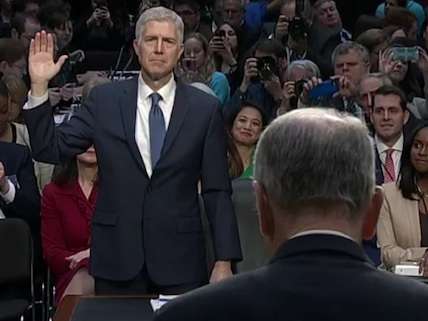Neil Gorsuch Joins Liberals in 5-4 SCOTUS Opinion Striking Down Portion of Federal Immigration Law
The Supreme Court rules against the federal government in Sessions v. Dimaya.

Today the U.S. Supreme Court struck down a provision of the Immigration and Nationality Act which dealt with the power of the U.S. government to deport any alien, including a lawful permanent resident, convicted of an "aggravated felony." The 5-4 ruling was written by Justice Elena Kagan and joined by Justices Ruth Bader Ginsburg, Stephen Breyer, and Sonia Sotomayor. Justice Neil Gorsuch, who concurred in part and joined in the judgment, provided the tie-breaking fifth vote.
At issue in Sessions v. Dimaya is a provision of the Immigration and Nationality Act which lists being convicted of "a crime of violence" as one of the types of aggravated felony convictions that can trigger an alien's deportation. This provision defines "a crime of violence" to include any offense that "is a felony and that, by its nature, involves a substantial risk that physical force against the person or property of another may be used in the course of committing the offense."
In its opinion today, the Court struck down that provision as unconstitutionally vague. "The void-for-vagueness doctrine, as we have called it," observed the majority opinion of Justice Kagan, "guarantees that ordinary people have 'fair notice' of the conduct a statute proscribes."
In his concurrence, Justice Gorsuch explained the constitutional principle that demanded this result:
Before holding a lawful permanent resident alien like James Dimaya subject to removal for having committed a crime, the Immigration and Nationality Act requires a judge to determine that the ordinary case of the alien's crime of conviction involves a substantial risk that physical force may be used. But what does that mean? Just take the crime at issue in this case, California burglary, which applies to everyone from armed home intruders to door-to-door salesmen peddling shady products. How, on that vast spectrum, is anyone supposed to locate the ordinary case and say whether it includes a substantial risk of physical force? The truth is, no one knows. The law's silence leaves judges to their intuitions and the people to their fate. In my judgment, the Constitution demands more.
The upshot of today's ruling is that it is now more difficult for the federal government to deport aliens under the terms of the Immigration and Nationality Act.
The Supreme Court's decision in Sessions v. Dimaya is available here.


Show Comments (234)